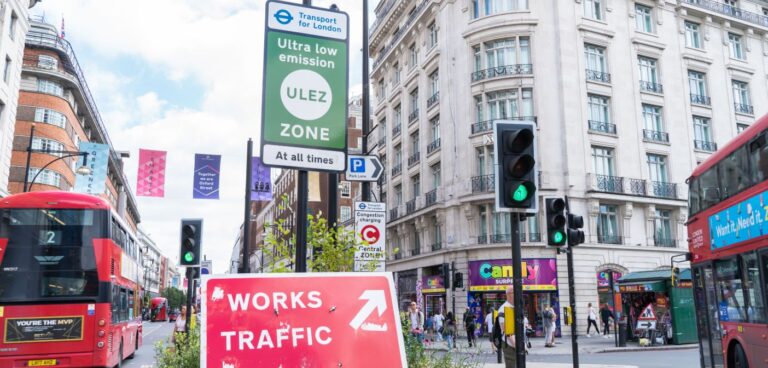London’s Ultra Low Emission Zone (ULEZ) could be expanded for a second time in 2023 – this time covering the whole of Greater London – after Transport for London (TfL) said it was “still many years away” from being ready to implement a smart road-pricing scheme.
The ULEZ, which was implemented in April 2019 and initially covered the same eight sq-mile area as the Congestion Charge zone, was expanded on 25 October 2021, creating a single larger zone up to the North Circular Road (A406) and South Circular Road (A205).
Since then, according to TomTom’s 11th annual Traffic Index, a report detailing London traffic trends throughout 2021, CO2 emissions have reduced by 5%, PM emissions by 40% and NOx emissions by almost 54%.
The latest proposed expansion would make the ULEZ London-wide – in line with the current Low Emission Zone (LEZ) boundary.
The news comes after TfL presented Khan with a range of policy options designed to quickly reduce traffic and associated emissions as the transport operator works to overcome technological and operational challenges associated with introducing a smart road-user charging scheme – Khan’s preferred long-term solution – by the end of the decade.
Read more: ‘No viable alternative’ to UK road pricing, transport committee finds
The other policy options, which Khan has now ruled out, included introducing a Greater London Boundary Charge for vehicles driving into London and implementing a low-level daily Clean Air Charge for all but the cleanest vehicles.
Khan said: “In weighing up the different options, the rising cost of living was a key consideration for me. Because at a time when people’s budgets are under pressure, I’m not willing to ask people to pay more unless I’m absolutely convinced it’s justified to save lives and protect the health of Londoners.
“I believe the proposal to extend the ULEZ London-wide will have the biggest effect on emissions and congestion relative to the potential financial impact on Londoners as a whole.”
Read more: UK motorists prefer EV tax over road pricing, survey suggests
By extending the ULEZ to cover the whole of Greater London, as the current LEZ does, early assessments indicate that the move could reduce NOx emissions from cars and vans by between 285-330 tonnes; lead to a 10% NOx reduction from cars and vans in outer London; reduce CO2 emissions in outer London by between 135,000-150,000 tonnes; and cut the number of the most polluting cars on London’s roads by between an additional 20,000-40,000 a day.
Khan has committed to help charities, small businesses, disabled people and Londoners on lower incomes adapt to the potential London-wide ULEZ, with “as big a scrappage scheme as is feasible” to help motorists in outer London scrap older, more polluting vehicles and switch to cleaner forms of transport, use a car club vehicle or purchase newer, cleaner models that are ULEZ-compliant.
However, the mayor still favours a smart road-user charging scheme that would enable all existing road charges, such as the Congestion Charge and ULEZ, to be replaced with a simpler scheme that charges motorists on a per mile basis. This could allow for different rates to be charged depending on how polluting vehicles are, the level of congestion in the area and access to public transport.
Christina Calderato, director of transport strategy and policy at TfL, said: “Road-based transport has for many years been a major contributor towards poor air quality and carbon emissions and we are determined to tackle this through a wide range of programmes across TfL.
“The world-leading road-user charging schemes we’ve delivered throughout the last two decades have been really effective, but it is clear that as a city we need to go further.”
Any new or amended road-user charging scheme, if taken forward, would be subject to further assessment and analysis, full equality impact assessments, with potential mitigations and exemptions for disabled people, Londoners on low incomes and additional support for small businesses and charities a key focus.
You can learn more about the key trends and challenges affecting senior decision-makers who have responsibility for tolling, intelligent transportation systems and road pricing at the 19th annual Road User Charging Conference in Brussels, Belgium on 04-05 May 2022. Visit www.roaduserchargingconference.co.uk for more information.





